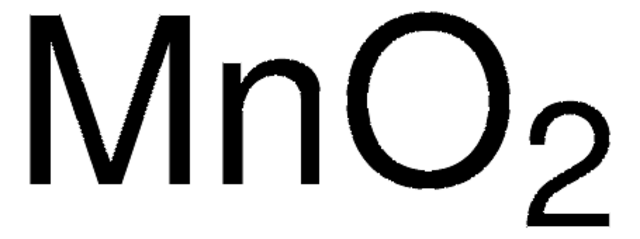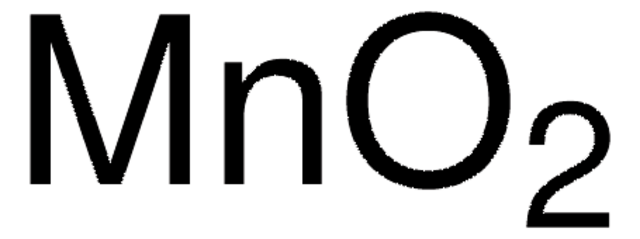Wichtige Dokumente
377473
Mangan(II,III)-oxid
97%
Synonym(e):
MnO.Mn2O3
About This Item
Empfohlene Produkte
Qualitätsniveau
Assay
97%
Form
powder
Dichte
4.8 g/mL at 25 °C (lit.)
Anwendung(en)
battery manufacturing
SMILES String
O=[Mn]O[Mn]O[Mn]=O
InChI
1S/3Mn.4O
InChIKey
GVNFAUMGUISVJW-UHFFFAOYSA-N
Suchen Sie nach ähnlichen Produkten? Aufrufen Leitfaden zum Produktvergleich
Verwandte Kategorien
Allgemeine Beschreibung
Signalwort
Warning
H-Sätze
Gefahreneinstufungen
Repr. 2
Lagerklassenschlüssel
11 - Combustible Solids
WGK
nwg
Flammpunkt (°F)
Not applicable
Flammpunkt (°C)
Not applicable
Persönliche Schutzausrüstung
dust mask type N95 (US), Eyeshields, Gloves
Hier finden Sie alle aktuellen Versionen:
Besitzen Sie dieses Produkt bereits?
In der Dokumentenbibliothek finden Sie die Dokumentation zu den Produkten, die Sie kürzlich erworben haben.
Kunden haben sich ebenfalls angesehen
Artikel
Synthesis, Properties, and Applications of Perovskite-Phase Metal Oxide Nanostructures
Magnetism and magnetic materials have been of scientific interest for over 1,000 years. More recently, fundamental investigations have focused on exploring the various types of magnetic materials and understanding the magnetic effects created by electric currents.
Magnetic materials permeate numerous daily activities in our lives. They are essential components of a diversity of products including hard drives that reliably store information on our computers, decorative magnets that keep the shopping list attached to the refrigerator door, electric bicycles that speed our commute to work, as well as wind turbines for conversion of wind energy to electrical power.
Global Trade Item Number
| SKU | GTIN |
|---|---|
| 377473-2KG | |
| 377473-500G | |
| 377473-100G | 4061831835663 |
Unser Team von Wissenschaftlern verfügt über Erfahrung in allen Forschungsbereichen einschließlich Life Science, Materialwissenschaften, chemischer Synthese, Chromatographie, Analytik und vielen mehr..
Setzen Sie sich mit dem technischen Dienst in Verbindung.









